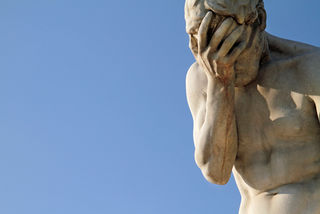The Roots of Shame
Do feelings of chagrin help us socially?
By Lucy Hicks published January 2, 2019 - last reviewed on March 5, 2019

Though shame feels isolating, it may have evolved as an emotional force that protects one's social lifelines: By avoiding the behaviors that elicit shame, one can remain a valued member of society. Recent research shows a close link in communities around the world between a group's collective judgments and the anticipated shame of individual members.
A research team surveyed 899 individuals from 15 small-scale communities on four continents. Some residents were asked to rate the level of shame they would feel if, for example, they stole from a community member, broke promises, or were lazy. Others rated how negatively they would view someone else who fit those descriptions.
Individuals' shame ratings were strongly correlated with the level of their community's disapproval in all surveyed locations, aligning with previous research in the United States, India, and Israel. The geographically dispersed cultures in this study also varied in terms of religion and language, notes lead author Daniel Sznycer, a psychologist at the University of Montreal. "This suggests that shame is not a particular cultural development, present in some societies but not others," he says, "but rather something that is a fundamental part of human nature."
